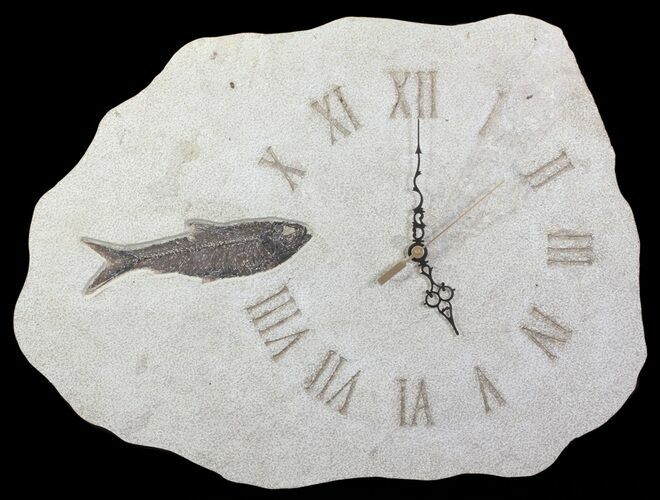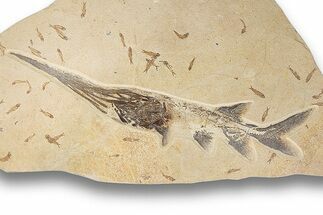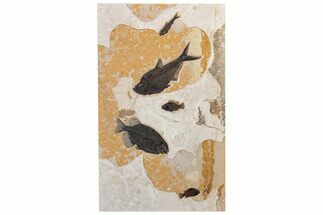This Specimen has been sold.
19" Wide Clock With Natural Fossil Fish - Wyoming
This is a really cool clock made out of a slab of shale containing a very large, 7" long Knightia eocaena fish fossil. The fish in their natural position in an unbroken slab of shale which has been shaped, backed with wood for hanging and had a working clock mechanism installed.
The fossils were quarried from the Eocene aged (45-50 million year old) Green River Formation near Kemmerer, Wyoming.
The fossils were quarried from the Eocene aged (45-50 million year old) Green River Formation near Kemmerer, Wyoming.
About Fossil Lake
50 million years ago, in the Eocene epoch, these fish thrived in Fossil Lake, which was fed by the Uinta and Rocky Mountain highlands. The anoxic conditions at the bottom of Fossil Lake slowed bacterial decomposition, prevented scavengers from disturbing corpses, and, most interestingly, suffocated creatures that ventured into the oxygen-starved aquatic layer. The result is a miraculous exhibition of Eocene biota: a subtropical aquatic community within sycamore forests, teeming with creatures such as freshwater stingrays, dog-sized horses, menacing alligators, early flying bats, and one of the first primates.
50 million years ago, in the Eocene epoch, these fish thrived in Fossil Lake, which was fed by the Uinta and Rocky Mountain highlands. The anoxic conditions at the bottom of Fossil Lake slowed bacterial decomposition, prevented scavengers from disturbing corpses, and, most interestingly, suffocated creatures that ventured into the oxygen-starved aquatic layer. The result is a miraculous exhibition of Eocene biota: a subtropical aquatic community within sycamore forests, teeming with creatures such as freshwater stingrays, dog-sized horses, menacing alligators, early flying bats, and one of the first primates.
SPECIES
Knightia eocaena
LOCATION
Kemmerer, Wyoming
FORMATION
Green River Formation
SIZE
Fish 7", Clock 19.3 x 14.4"
CATEGORY
SUB CATEGORY
ITEM
#64197
We guarantee the authenticity of all of our specimens.
 Reviews
Reviews












